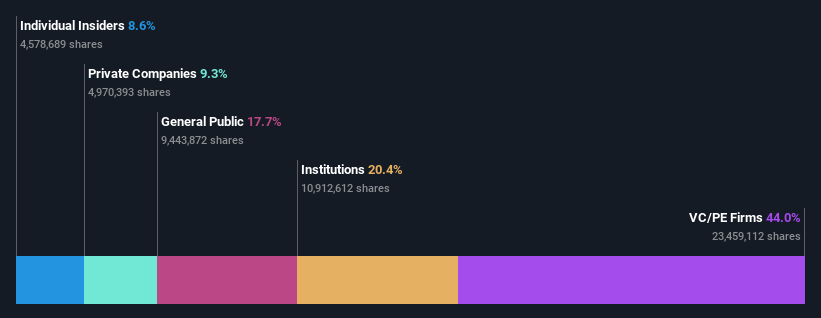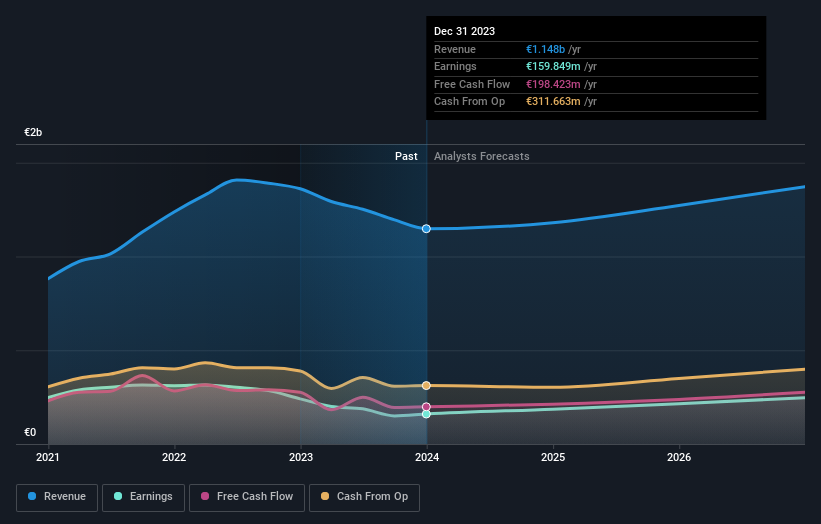Stock Analysis
- Italy
- /
- Medical Equipment
- /
- BIT:DIA
While institutions own 20% of DiaSorin S.p.A. (BIT:DIA), private equity firms are its largest shareholders with 44% ownership

Key Insights
- DiaSorin's significant private equity firms ownership suggests that the key decisions are influenced by shareholders from the larger public
- The top 3 shareholders own 53% of the company
- Institutions own 20% of DiaSorin
If you want to know who really controls DiaSorin S.p.A. (BIT:DIA), then you'll have to look at the makeup of its share registry. The group holding the most number of shares in the company, around 44% to be precise, is private equity firms. In other words, the group stands to gain the most (or lose the most) from their investment into the company.
Institutions, on the other hand, account for 20% of the company's stockholders. Large companies usually have institutions as shareholders, and we usually see insiders owning shares in smaller companies.
Let's take a closer look to see what the different types of shareholders can tell us about DiaSorin.
See our latest analysis for DiaSorin

What Does The Institutional Ownership Tell Us About DiaSorin?
Institutions typically measure themselves against a benchmark when reporting to their own investors, so they often become more enthusiastic about a stock once it's included in a major index. We would expect most companies to have some institutions on the register, especially if they are growing.
As you can see, institutional investors have a fair amount of stake in DiaSorin. This implies the analysts working for those institutions have looked at the stock and they like it. But just like anyone else, they could be wrong. It is not uncommon to see a big share price drop if two large institutional investors try to sell out of a stock at the same time. So it is worth checking the past earnings trajectory of DiaSorin, (below). Of course, keep in mind that there are other factors to consider, too.

Hedge funds don't have many shares in DiaSorin. Investimenti e Partecipazioni Spa is currently the largest shareholder, with 44% of shares outstanding. With 4.4% and 4.3% of the shares outstanding respectively, Carlo Rosa and M.C. S.R.L. are the second and third largest shareholders. Carlo Rosa, who is the second-largest shareholder, also happens to hold the title of Chief Executive Officer.
A more detailed study of the shareholder registry showed us that 3 of the top shareholders have a considerable amount of ownership in the company, via their 53% stake.
While it makes sense to study institutional ownership data for a company, it also makes sense to study analyst sentiments to know which way the wind is blowing. There are plenty of analysts covering the stock, so it might be worth seeing what they are forecasting, too.
Insider Ownership Of DiaSorin
While the precise definition of an insider can be subjective, almost everyone considers board members to be insiders. Management ultimately answers to the board. However, it is not uncommon for managers to be executive board members, especially if they are a founder or the CEO.
I generally consider insider ownership to be a good thing. However, on some occasions it makes it more difficult for other shareholders to hold the board accountable for decisions.
Our most recent data indicates that insiders own some shares in DiaSorin S.p.A.. It is a pretty big company, so it is generally a positive to see some potentially meaningful alignment. In this case, they own around €441m worth of shares (at current prices). It is good to see this level of investment by insiders. You can check here to see if those insiders have been buying recently.
General Public Ownership
The general public-- including retail investors -- own 18% stake in the company, and hence can't easily be ignored. This size of ownership, while considerable, may not be enough to change company policy if the decision is not in sync with other large shareholders.
Private Equity Ownership
With an ownership of 44%, private equity firms are in a position to play a role in shaping corporate strategy with a focus on value creation. Some might like this, because private equity are sometimes activists who hold management accountable. But other times, private equity is selling out, having taking the company public.
Private Company Ownership
We can see that Private Companies own 9.3%, of the shares on issue. Private companies may be related parties. Sometimes insiders have an interest in a public company through a holding in a private company, rather than in their own capacity as an individual. While it's hard to draw any broad stroke conclusions, it is worth noting as an area for further research.
Next Steps:
I find it very interesting to look at who exactly owns a company. But to truly gain insight, we need to consider other information, too. Case in point: We've spotted 1 warning sign for DiaSorin you should be aware of.
If you are like me, you may want to think about whether this company will grow or shrink. Luckily, you can check this free report showing analyst forecasts for its future.
NB: Figures in this article are calculated using data from the last twelve months, which refer to the 12-month period ending on the last date of the month the financial statement is dated. This may not be consistent with full year annual report figures.
Valuation is complex, but we're helping make it simple.
Find out whether DiaSorin is potentially over or undervalued by checking out our comprehensive analysis, which includes fair value estimates, risks and warnings, dividends, insider transactions and financial health.
View the Free AnalysisHave feedback on this article? Concerned about the content? Get in touch with us directly. Alternatively, email editorial-team (at) simplywallst.com.
This article by Simply Wall St is general in nature. We provide commentary based on historical data and analyst forecasts only using an unbiased methodology and our articles are not intended to be financial advice. It does not constitute a recommendation to buy or sell any stock, and does not take account of your objectives, or your financial situation. We aim to bring you long-term focused analysis driven by fundamental data. Note that our analysis may not factor in the latest price-sensitive company announcements or qualitative material. Simply Wall St has no position in any stocks mentioned.
About BIT:DIA
DiaSorin
Engages in development, manufacture, and distribution of immunodiagnostics and molecular diagnostics testing kits in Europe, Africa, North America, Central and South America, the Asia Pacific, and China.
Adequate balance sheet average dividend payer.


